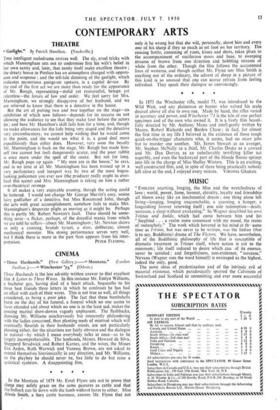CINEMA
Three Husbands." (New Gallery.)—" Montana." (London Pavilion.)—" Winchester '73: (Odeon.) Three Husbands is the less adroitly written answer to that excellent film A Letter to Three Wives. In this instance Mr. Emlyn Williams, a bachelor gay, having died of a heart attack, bequeaths to his three best friends three letters in which he confesses he has had an affair with each of their wives. This is not true as well, all things considered, as being a poor joke. The fact that these bombshells burst on the day of his funeral, a funeral which no one seems to have attended and about which no one is in the least sad, makes the ensuing marital show-downs vaguely unpleasant. The flashbacks, showing Mr. Williams mischievously but innocently philandering with the ladies concerned, thus planting seeds of mistrust which will eventually flourish in their husbands' minds, are not particularly pleasing either, for the situations are fairly obvious and the dialogue so natural—by which I mean everybody talks at once—as to be largely incomprehensible. The husbands, Messrs. Howard da Silva. Shepperd Strudwick and Robert Karnes, and the wives, the Misses Eve Arden, Ruth Warwick and Vanessa Brown, are not asked to extend themselves histrionically in any direction, and Mr. Williams, as the playboy he should never be, has little to do but raise a quizzical eyebrow. A disappointing film.
* * k *
In the Montana of 1879 Mr. Errol Flynn sets out to prove that sheep may safely graze on the same pastures as cattle and that the bullock can lie down with the lamb without harm to either. Miss Alexis Smith, a fiery cattle baroness, assures Mr. Flynn that not only is he wrong but that she will, personally, shoot him and every one of his sheep if they so much as set foot on her territory. The ensuing battle, consisting of ruses, kisses and shots, takes place to the accompaniment of vociferous moos and baas, to sweeping streams of brown from one direction and bobbling streams of white from the other. Though the film follows the accustomed lines of westerns, and though neither Mr. Flynn nor Miss Smith is anything out of the ordinary, the advent of sheep in a picture of this kind is so unusual that one can scarce refrain from feeling refreshed. They speak their dialogue so convincingly.
In 1873 the Winchester rifle, model 73, was introduced to the Wild West, and any plainsman or hunter who valued his scalp desired above all else to own one. Made by hand, the rifles varied in accuracy and power, and Winchester '73 is the tale of one perfect specimen and of the men who owned it. It is a lively film beauti- fully directed by Mr. Anthony Mann and intelligently written by Messrs. Robert Richards and Borden Chase ; in fact, for almost the first time in my life I believed in the existence of those tough quick-on-the-trigger characters who, it seems, had no other jobs but to murder one another. Mr. James Stewart as an avenger, Mr. Stephen McNally as a thief, Mr. Charles Drake as a coward and Mr. Dan Duryea as an unbelievably terrifying killer act superbly, and even the hackneyed part of the blonde floosie springs into life in the charge of Miss Shelley Winters. This is an exciting, well constructed film, and, in spite of there being practically nobody left alive at the end, I enjoyed every minute. VIRGINIA GRAHAM.






































 Previous page
Previous page